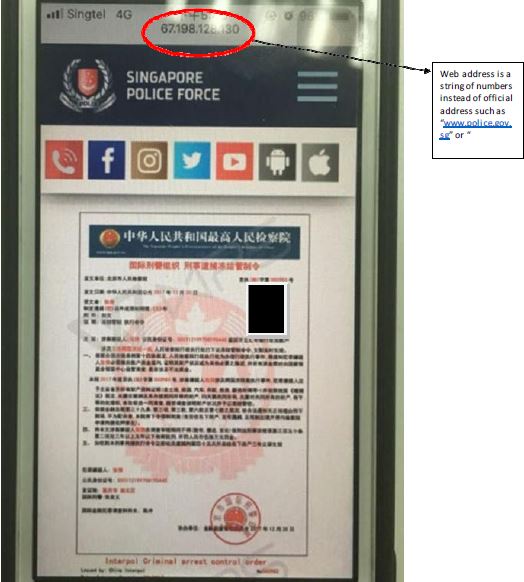Between January and November this year, Police have received at least 158 reports where members of the public had been duped by persons pretending to be a Chinese government official from the China Ministry of Public Security or China INTERPOL. To date, victims have lost more than S$12 million to these scams.
The modus operandi of such a scam is as follows:
Step 1: Victims received unsolicited messages or calls from strangers. These calls usually employ caller-ID spoofing technology and may look like they are from official government hotline numbers such as “110” or “999”.
Step 2: Victims were then told that they had committed criminal offences and were required to assist in criminal investigations by doing either of the following, in order to prove that the money they owned was “clean”.
-
Victims were instructed to provide their internet banking details, One-Time Password (OTP) for investigation purposes, or directed to a fake website of the Singapore Police Force or the China Police to key in their banking details. Victims might also be shown fake “warrant of arrests” bearing their photographs on these fake websites (see Annex A).
-
Victims were asked to withdraw their money and pass it to other strangers or remit the money to bank accounts in China.
-
Victims were instructed to send nude photos of themselves to prove that they did not have unique features on the body that resembled the criminals the scammers claimed they were looking for.
Step 3: Victims were then threatened with arrests by the ‘China authorities’ or exposure of the photos if they did not do as told.
In a recent case, a male 19-year-old Chinese national student had believed the China Official impersonators that he was under investigation by the Chinese INTERPOL. In order to prove his innocence, he had to follow every instruction of the scammers, which included cutting off all communication with his friends and family members. He was believed to have been deceived into acting as a secret operative for the Chinese authorities to collect monies from other victims as well as faking his own kidnapping in Singapore in order to help the Chinese authorities cripple an international criminal syndicate. In actual fact, the subject was assisting the impersonators in other scam cases targeted at Singapore residents. He is currently assisting in Police’s investigations.
In another separate case, a female 17-year-old Chinese national student had believed that her credit card was being used for money laundering when she received an unknown caller claiming to be an official from the “International Financial department unit”. In order to show that she was not connected to the case and did not have any alleged sexual relationship with another male money launderer, she was instructed to send nude photos to verify features on her body. She was later asked to transfer money to a bank account in China. When she failed to do so, she was threatened with the exposure of her photos on Facebook. The subject then realised that it could be a scam before reporting the matter to the Police.
Police take a serious view against any person who may be involved in scams, whether knowingly or unwittingly. Anyone found to be involved in such scams will be subjected to Police investigations. Under the Corruption, Drug Trafficking and Other Serious Crimes (Confiscation of Benefits) Act, any person who is guilty of knowingly assisted in dealing with the monies derived from criminal conduct shall be liable upon conviction to a fine not exceeding $500,000 or to imprisonment for a term not exceeding 10 years or to both.
Police would also like to advise members of the public to take the following precautions when they receive unsolicited calls, especially from unknown parties:
-
Ignore such calls and the caller’s instructions.
No government agency will instruct payment through a telephone call or other social messaging platforms (WeChat or Facebook); or ask you for personal banking information such as your internet banking passwords
-
For foreigners receiving calls from persons claiming to be from Police in your home country, call your Embassy/High Commission to verify the claims of the caller.
-
Refrain from giving out personal information and bank details, whether on the website or to callers over the phone. Personal information and bank details such as internet bank account usernames and passwords, OTP codes from tokens, are useful to criminals. Do not make any funds transfer.
-
-
Call a trusted friend or talk to a relative before you act. You may be overwhelmed by emotion and err in your judgment.
If you have any information related to such crime, please call the Police hotline at 1800-255 0000, or dial ‘999’ for urgent Police assistance.
To seek scam-related advice, members of the public may call the anti-scam helpline at 1800-722-6688 or go to www.scamalert.sg. Please share this advisory with your family and friends to prevent them from being the next scam victim.
SINGAPORE POLICE FORCE
28 December 2017 @ 3:40 PM


